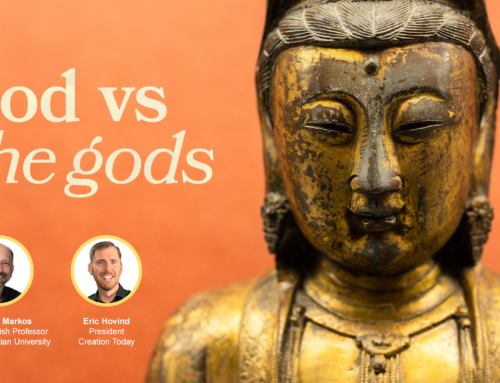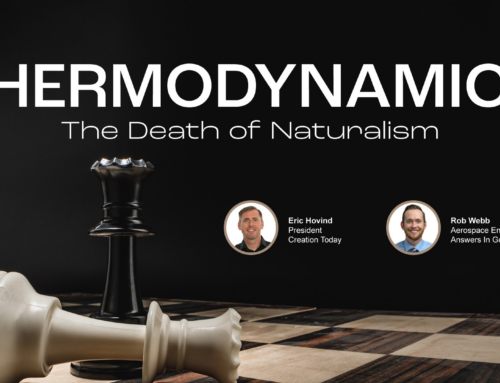We received a message yesterday, which was presumably not from one of our supporters. It read “The Higgs Boson is a much greater blow to your beliefs than Darwin’s theory, good luck and welcome to the age of science.” Let me explain why such a comment is particularly foolish.
What is a Higg’s Boson? A boson is an elementary particle, predicted by the Standard Model of particle physics. All other such predicted particles have been discovered. The Higg’s Boson was the last one. This suggests that the Standard Model is a pretty good working model! Good observational science involves such elements as developing hypotheses, making testable predictions, then carrying out fair tests to verify these predictions, then adapting or rejecting the original hypothesis accordingly, if necessary. So the experiment that “observed” this Higg’s Boson would appear to be an example of good science. However, the hype surrounding it, including its rather blasphemous nickname, is an example of bad science.
Einstein’s theories of relativity explain why particles moving fast possess mass. The difficulty physicists have had is explaining why particles at rest sometimes have mass. The physicist Peter Higgs suggested that a field exists, which could interact with particles, thus producing the phenomenon known as mass. This field is now known as the Higg’s Field. The reason for the nickname is that journalists and other “popularizers” have assumed that the particle produced by this field interaction—the Higg’s Boson—somehow magically “gives” mass to other particles. This is not so, and most serious particle physicists are embarrassed by the nickname.
Furthermore, those physicists who believe in the Big Bang theory suppose that this field would have caused this interaction at the point of the expansion of the singularity. It is indeed logical to state that IF there were a Big Bang, then this would be the case. Readers should note that a logical progression—obeying the laws of logic—does not imply that something is true. Something can be completely logical yet untrue if the original presupposition is untrue. In this case, the original presupposition is that the universe began in a Big Bang. This is untrue, and it is worth mentioning that it is not only Christians and creationists who do not believe in the Big Bang. A significant minority of secular physicists do not accept the Big Bang either. The key word in the logical statement above is the word “if.”
Here is an example to illustrate what I mean: When I grew up in Manchester, England, there were two large professional soccer teams in the city (there still are!) called Manchester United, who usually play in red, and Manchester City, who usually play in blue. So, if you knew that a certain child was a Manchester United supporter, then you would expect to see him wearing a red soccer shirt, not a blue one. If, on the other hand, you saw a child wearing a red soccer shirt in Manchester, you might assume that he was a United supporter. Your assumption might be wrong. He and his family might have been visiting Manchester for the day from nearby Liverpool, whose eponymous soccer team also plays in red. The assumption that the wearing of a red soccer shirt proves that the boy is a United supporter is illogical.
In the same way, it is logical to state that, if the Big Bang were correct, then the existence of the Higg’s Boson makes sense. However, it is illogical to state that the existence of the Higg’s Boson proves that the Big Bang happened. There are alternative explanations, and many of the peer-reviewed creationist journals have already carried articles on this subject.
Moreover, readers should also note that no one has actually “seen” this Higg’s Boson. You cannot pick it up by shining light on it, as you would with macroscopic articles. So, in practice, the experimenters at CERN have taken a lot of measurements of field perturbations and have lots of numbers, a great deal of which fall into the range, which they predicted that they would obtain, if the Higg’s Boson existed. Therefore, the existence of the Higg’s Boson is an inference rather than a direct observation. By stating this, I am in no way pouring cold water on the ability of these excellent scientists. If you hear a loud meowing noise in a neighboring locked room, you might assume that there is a cat stuck in there, though there may be alternative explanations.
It is exciting for the physicists concerned to know that their experiments are working and producing interesting and novel results. No doubt the serious physicists are looking forward to examining the results in more detail to draw further conclusions. If these scientists are making us more aware of the amazing way in which God maintains this universe that He has created for us, then this is a good thing, and we can share their excitement. Readers should not be under any illusion that any such observations and measurements make the slightest bit of difference to the truth that God made this universe in precisely the way that He said He did. There is nothing in any of these experiments that can ever, under any circumstances, disprove God, and inventing a new mythology of a “God particle” only makes our critics, with a minimal knowledge of what is actually happening, look foolish. If you think my use of the word “foolish” is insulting, then I should point out that I am using the word in exactly the same way that the Bible does in Psalm 14:1.






